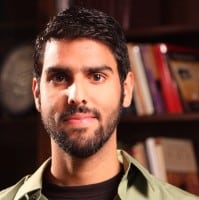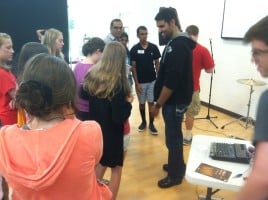Podcast: Play in new window | Download
Subscribe: RSS

We have an incredible man and scholar with us this week – and you’re probably wondering, “How smart could he be if he’s willing to be a guest on my podcast?” – But, I’m honored to be joined by Dr. Nabeel Qureshi.
Dr. Qureshi is a former devout Muslim who was convinced of the truth of the Gospel through historical reasoning and a spiritual search for God. Since his conversion, he has dedicated his life to spreading the Gospel through teaching, preaching, writing, and debate.
As a fan of both his story and the things God has revealed to him, I wholeheartedly encourage you to read Nabeel’s book, Seeking Allah, Finding Jesus.
Nabeel has given lectures at universities and seminaries throughout North America. He has participated in multiple public debates all around the globe. His focus is on the foundations of the Christian faith and the early history and teachings of Islam. And, he is a member of the speaking team at Ravi Zacharias International Ministries. He holds an MD from Eastern Virginia Medical School, an MA in Christian apologetics from Biola University, and an MA from Duke University in Religion.
All this to say, I recently was listening to his story on, of all places – not a fancy university or seminary – but YouTube! Now, as a Tennessean, one thing that struck me right out of the gate was that Nabeel’s father arrived in the United States from Damascus on the exact same day that the King died. No, not the king of Syria.. our King… Elvis Presley!
Nabeel was raised in a Muslim home, with all its daily traditions: waking up in the morning and reciting the first of five daily prayers, reciting portions of the Quran throughout the day, and pausing at the appointed times in each day to recite the other four daily prayers. Like a good, faithful Muslim, Nabeel had memorized the last seven chapters of the Quran, as well as several other Arabic phrases necessary to lead a devout Muslim life.
It only made sense, that as Nabeel grew up, he found himself developing into quite the Islamic apologist. He was taught, like so many Muslims living in Western Culture, how to defend Islam and why Christianity is false.
So, from a very young age, he was taught that the Bible is not trustworthy, that the Trinity is nonsensical and Jesus is not God, and other arguments against Christian beliefs.
When Nabeel was in high school, he met a girl who uncompromisingly lived out her Christian convictions. While he knew several people who claimed to follow Jesus, she was the only one who went out of her way to explain the Gospel to him.
He replied to her, “Betsy, do you honestly believe that Jesus was God? Because even Jesus, Himself said, ‘Why do you call me good? No one is good–except God alone.’ Jesus also said that He didn’t know when the end of times is: ‘…no one knows, not even the angels in heaven, nor the Son, but only the Father.’ Jesus also said in John 14:28, ‘I am going to the Father, for the Father is greater than I.’ So, how could you believe that Jesus is God when He, Himself said all these things?”
Poor Betsy didn’t stand a chance at convincing Nabeel that Christianity was the Way to eternal life as God intends. She simply wasn’t trained to offer up a defense of her faith.
I could totally relate to Betsy. For the first few years of my following Jesus, I probably couldn’t answer all of Nabeel’s arguments, either. But as Paul wrote: you feed a baby milk, but at some point they need to mature and you need to give them something solid in order for them to grow. I believe that today, I’ve noticed an awakening amongst a lot of Christians who are realizing that they need to learn to defend their faith. Not only from the new atheists, but from Hindus and Muslims as well.
Nabeel sees a similar trend in certain Christian circles. He has noticed a cognizance that you cannot go on being a Christian these days without having a reason for it. So many Christ-followers are ridiculed and mocked for their faith, which is why he sees more and more people stepping up and learning how to defend their faith intelligently as well as full of faith.
I’ve mentioned several times on this podcast and in other discussions that there is a huge need across the U.S. for churches to engage middle schoolers, high schoolers, and college students in a whole new way so that they are prepared to stand firm in their Christian walk in the culture of today’s universities. Nabeel, having spent more time than even most professors at colleges all across the western world, has a very clear perspective on this.
According to Nabeel, a lot of the opposition that today’s Christian students face is overt, while a lot of it is also covert. He recalls one friend’s experience on her first day of a Sociology class at a state university, where the professor asked, “How many of you are Christian?” Several students raised their hands. The professor then continued, “If you are a Christian, I’m going to give you the opportunity to leave this class right now because by the end of the semester, you won’t be leaving it as a Christian.” That, from someone who is paid by the government to teach a class about how humans interact. And this wasn’t an isolated event. Nabeel has heard from multiples of students who have experienced professors not just going after religion, but specifically Christianity from the front of their classrooms. There was a recent survey by two Jewish researchers who were looking to find if there was an anti-Semitic bias amongst collegiate professors. They were actually shocked at their research when they discovered that there was a small anti-Semitic bias, but greater than 50% of university professors are biased against evangelical Christians. Couple that with all the other temptations and “YOLO” (You Only Live Once) culture opportunities that today’s Christians students face and they need, more than ever, to have strong reasons to stand firm in the faith that they were raised with.
It’s like being 18-years-old and walking into a buzz saw.
Nabeel, on the other hand, couldn’t wait to get to college! He was excited to debate religion, politics and issues with knowledgeable, intelligent Christians. Sadly, he discovered that most Americans, especially Christians, don’t like to debate these topics. In the middle east, men of all ages passionately debate religion and politics, but here in the U.S., it’s largely frowned upon. It’s as if they’re not allowed to be passionate in public about their political or religious stances.
But, while on the Speech and Debate team in college, Nabeel met David – a Christian apologist who read the Bible in his spare time, not just at church for liturgical purposes.
Nabeel tried confronting David with his opinion that the Bible isn’t trustworthy since Jesus spoke Aramaic yet the earliest church spoke Hebrew and the New Testament was largely written in Greek, so by the time Jesus’ words were actually written, there was a translation of a translation. Then the text went from Greek to Latin to German before it was translated into English. So, how could it be trusted as the word of God?
Now, Nabeel had used this argument against many Christians in the past and not a single one could ever offer him an intelligent response.
Until he met David.
David admitted that the New Testament was translated from Greek, indeed. But, we have in our possession over 5,000 of the Greek manuscripts that were written within a single generation of when Christ lived. So, sure, Jesus spoke in Aramaic, but the disciples who wrote the New Testament were multi-lingual and were able to take Jesus’ words and accurately translate them into Greek.
In a matter of minutes, Nabeel learned a ton of information that he had never known before. From there, he and David embarked on a four-year journey of discussing truths about Christianity – getting past all the rhetoric – to what the core of it is all about.
Nabeel’s story is actually about twice the speed of most Muslims who convert to Christianity. It’s reported that it usually takes seven years of Christian evangelism – daily walking alongside them – before a Muslim will see God’s truth.
But this isn’t isolated to 21st century Muslims. Jesus walked daily with His disciples for three years, and they still didn’t quite get it when He was arrested, died and resurrected. So, this notion of “hit and run evangelism”, while it does work sometimes, typically doesn’t work.
Why does it take so long for a Muslim to convert to Christianity? Beyond the willingness to see God for Who He is, there is also the loss that is involved for a Muslim. When I came to Christ in my 40’s, I really didn’t loose anything. In fact, I gained my life!
But Nabeel faced losing so much as his discussions with David turned from academic debate to coming face to face with God and His truth. At first, when David would present something that went against what Nabeel had held true, he would take it to his Iman and other Muslim scholars as he sought out the truth. For example, he was taught that Islam was a religion of peace, and more often than not Muslims truly believe this, but the truth about Mohammad’s life tell a different story. Even from the earliest accounts of Mohammad’s life – Muslim records at that – you see one violent scene after another. Sometimes, Muslims are taught that Mohammad only fought defensive wars, but again, the historical writings speak to the contrary.
Now, according to traditional Islamic law, if someone were to leave Islam under certain circumstances, they could be killed for it. Many Muslims – especially in the West – don’t know this fact, but it is true. So, it’s difficult to accurately survey how many Muslims convert to Christianity each year around the world, especially in places where there is an active process of killing “apostates”. That said, there are still hundreds of thousands of Muslims leaving Islam to follow Jesus around the world.
One thing that Muslims wrestle with is that the Quran teaches many things that sound very Christian. It says that Jesus was born of a virgin. It says that He was able to heal the lepers, lame and blind and even raised people from the dead. It even teaches that Jesus will come back at the end of time. So, Muslims are taught that Jesus is a Messiah. But, they don’t quite use the same definition for “Messiah” as the Bible. Jesus is actually viewed as a prophet, among many others. When Jesus returns, the Muslims believe that He will come back as a Muslim prophet.
Then, there are the aspects that God’s forgiveness, grace and unadulterated, absolute love are not part of Islam’s perspective of who God is. Therefore, for many, when they are made aware of the Biblical truths of God, they are drawn to it in droves.
Now, for Nabeel, when it came time to tell his family that he was choosing to walk away from Islam, he knew it was going to change all aspects of his life. In western culture, we are raised to be individuals, from fiercely holding onto our individual human rights, to children being encouraged to express their individuality at school and in life. But the rest of the world is much more communal, especially in the “honor and shame cultures” of the Middle East, which are almost tribal in a sense. So, when Nabeel talked with his parents, he realized that their lives were geared toward their children, and likewise whatever he did directly reflected on their reputation and vice-versa.
To compile issues, his mother was the daughter and granddaughter of Muslim missionaries. He came from a long line of devout Muslims whose reputation was built on their service to Islam. So, for Nabeel to renounce his Islamic heritage and become a Christian, spat in the face of three generations of investment in their Islamic tradition. Because of what Nabeel had done, all the work that his grandfather and great-grandfather had put into being Muslim missionaries was thrown out the window, to his mother’s detriment. Her reputation was lost. And in a culture like this, reputation is everything. In regards to his father – his dad was the one in their circle who would often lead the five daily prayers, served the mosque faithfully, and was a prominent staple of their community. So, when Nabeel became a Christian, the accrued honor that his family had established was devastated. Then, when it came to personal relationships, his parents saw his decision as a betrayal to them, their family and all they stood for.
It’s been nearly a decade, and for a long time his parents didn’t approve of anything he did – they didn’t attend his wedding, they didn’t even speak to him for several years. But today, they have established a “new normal” between them, as some small aspects of their relationship is under repair.
One “tool” that was proven effective at the begging stages of rebuilding their relationship was “Bananas”, one of my stand up comedy DVD’s. They were rifling through a bunch of Nabeel’s movies and his mother pointed to it and said, “I’ll watch THAT.” Even though it featured a Christian comedian telling jokes and sharing my story about how I came to Christ, for some unknown reason, she agreed to watch. They laughed and were entertained, and they got to hear somebody else’s story, besides Nabeel’s, for the first time.